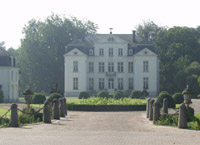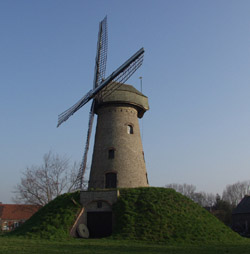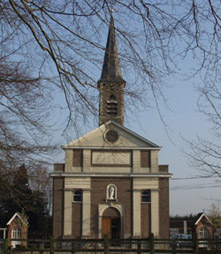The Meetjesland in the north of East-Flanders, Belgium

Wippelgem
The name comes from a 7th Century warrior who was called Wipula. «Wipula ingahaim» means the place of Wipula and his people. The word Wippelgem was first found in 13th Century documents. It was then part of the Duchy of Evergem. It was cut in half by the "Schipgracht" (Ships' Ditch) which in the 15th Century was renamed the "Burgravenstroom" (Viscounts River).
 Many of the good
and pious people of Wippelgem had to march about an hour to reach the nearest church
to fulfil their weekly religious obligations.
We cannot truthfully say that in Flanders a Sunday is always a sunny day. Until
about the Second Vatican Council there was an early Mass on Sundays and then there was
the High Mass at 10:30 or at the very latest 11 o'clock. So what was the routine
on Sunday ? Mama who had to prepare the Sunday lunch went to Mass early.
And while she was away attending Mass and after that, while she was chatting to the other
girls in the local grocer's (where she no doubt received a cup of coffee), papa kept an
eye on the kids and while all that was taking its course Brussels Radio played
(mostly) merry Classical music tunes. And the kids knew if they made too much noice
papa would wake up and tell them off.
Many of the good
and pious people of Wippelgem had to march about an hour to reach the nearest church
to fulfil their weekly religious obligations.
We cannot truthfully say that in Flanders a Sunday is always a sunny day. Until
about the Second Vatican Council there was an early Mass on Sundays and then there was
the High Mass at 10:30 or at the very latest 11 o'clock. So what was the routine
on Sunday ? Mama who had to prepare the Sunday lunch went to Mass early.
And while she was away attending Mass and after that, while she was chatting to the other
girls in the local grocer's (where she no doubt received a cup of coffee), papa kept an
eye on the kids and while all that was taking its course Brussels Radio played
(mostly) merry Classical music tunes. And the kids knew if they made too much noice
papa would wake up and tell them off.
Papa at last wakes up, heats up some water for his (weekly?) shave with lather and all the rest of it. Because as soon as mama gets home (let's hope she's not late and let's hope papa is ready, all dressed up in his Sunday best), he can now set off for High Mass. Being late for Mass on Sunday ? God forbid ! And after Mass he goes always to the same pub and plays a game of cards, always the same game and practically always with the same guys, he drinks a pint or two, and then he prefers a chocolate bar rather than an extra pint because he always tries to come home more than less sober and in the meantime... mama tries to keep her special Sunday lunch just hot enough and not too overcooked. Sunday is a day of rest and rest starts after lunch unless it's harvest time.
In other words if the people of Wippelgem had to walk for an hour to get to church Sunday mornings could be a little hectic.
As early as 1844 the good people of Wippelgem tried to get their own church in Wippelgem. But the village priest of Evergem, one Van Der Schaeghe, didn't like the idea for obvious if not very pious reasons. When he died in 1855 two noble families extended a helping hand: the De Neve-De Rode family donated the land just in front of the chateau and the Maertens-Pelckmans family of the "Ten Broeke" Estate had the church built.
The new neo-classicistic hall church was consecrated on 1 October 1856 with Joannes Peeters as Wippelgem's first village priest. The Evergem priest still didn't like it and the people of Evergem called it contemptuously the Bush Chapel. Wippelgem had to wait till 1907 before it was elevated to the status of a parish.
As you can see on the picture above the parish church Notre Dame of Consolation is flanked by two small chapels.
In front of the church there is the monumental entrance leading to the "Ten Hulle" Castle. There was a manor, a fortified farm, here already in 1375. Once upon a time this chateau belonged to the Hembyze's, a patrician family from Ghent. Van Hembyze was also Lord of Braeckele. That is why this estate is also called the "van Braeckele" Castle. In 1605 Joos van Braeckele died and now the castle came into the hands of his in-laws, the Triest family. In 1850 Baron de Neve de Rode inherited the castle. He was the one who donated a piece of land—not in the center of Wippelgem but in front of the chateau— for the church. Of the 17th Century domain we can still admire the dovehouse, the walled vegetable garden, the glasshouse and some of the restored salons, now used for receptions and other festivities. In the farmhouse there is now a restaurant and a pub.
 |
Gerard's Mill. |
Mr. Ludovicus Maertens bought the "Ten Broeke" Estate in 1825. He built here in 1843 the listed building we can still admire today. As we said above in 1856 he had the church built.
The town also has a beautiful windmill. It's called Gerard's Mill. You may read a word or two about it here.
Our source for much of the above is the excellent "Streekgids Meetjesland", pp. 71-75 by Freddy Pille.

More pictures
Our Meetjesland
— Table of Contents
— Find something in this Meetjesland website

MijnPlatteLand.com
Most recent update : 22-04-2021
Copyright Notice (c) 2026
